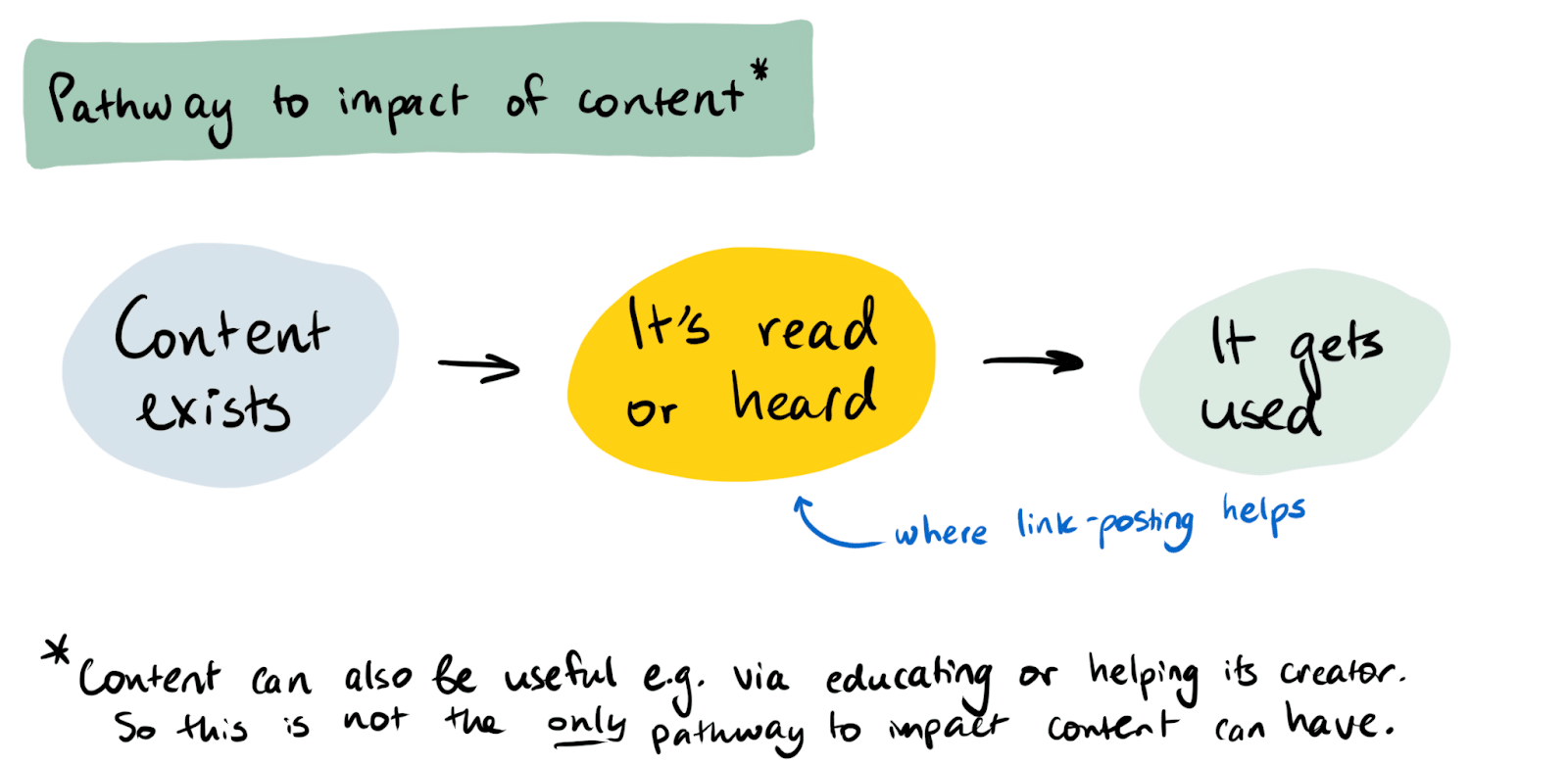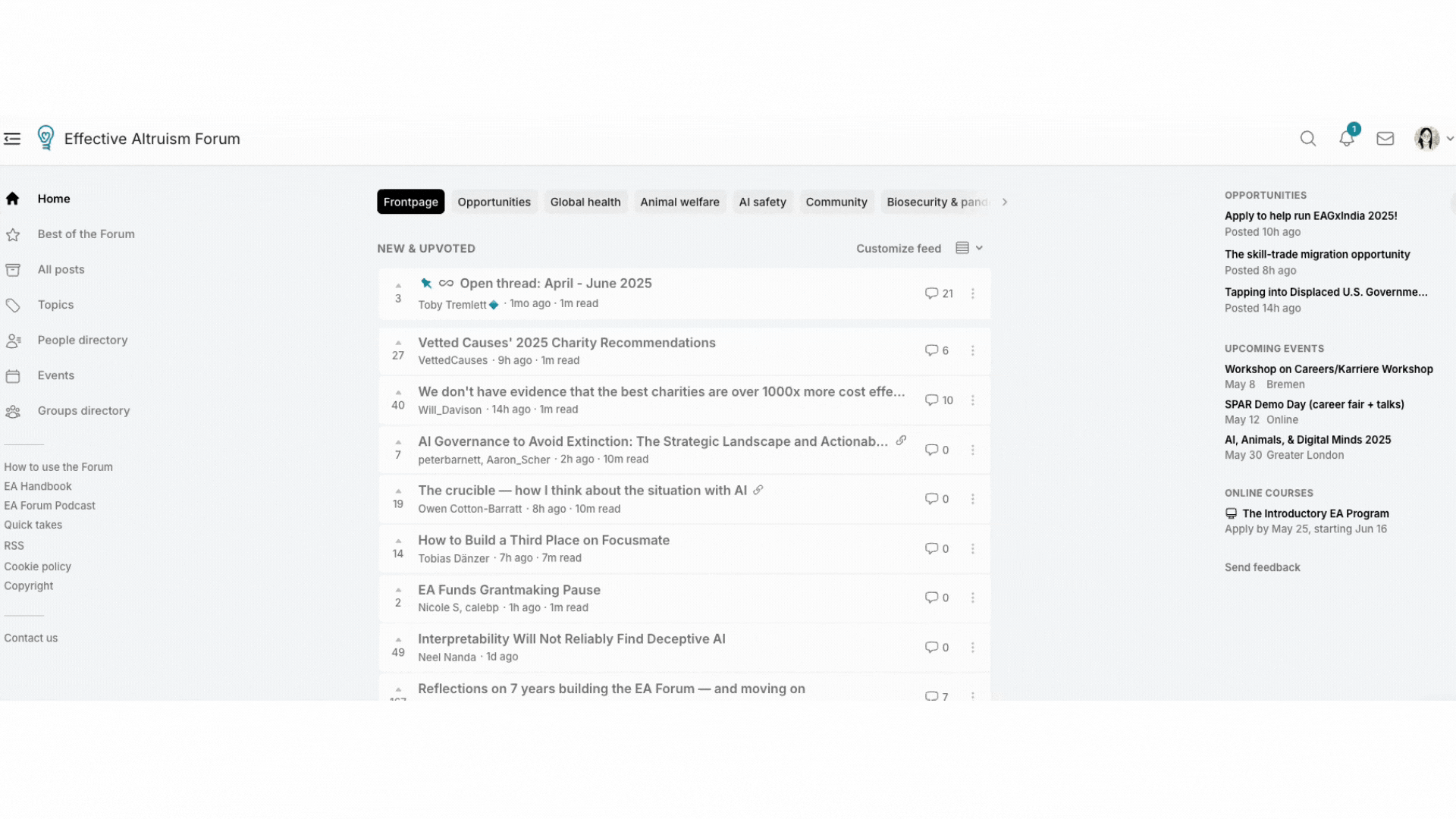TLDR: If you come across (or have produced) a piece of good content that’s relevant to effective altruism that isn’t on the EA Forum, please consider link-posting it (ideally, with a summary and a note about why you think it's relevant)!
Why link-post or cross-post?
Multiplication of reach: more people will see it
In the past week, the Forum’s Frontpage got around 20K unique pageviews (and this number is growing fast). These views are presumably from people looking for good content. My understanding is that a lot of people scan the Frontpage to see what they might be interested in, then click on posts that sound relevant, skim the beginning, and decide what they should read.
So if you find a good piece of writing (on “how to do the most good”), an easy way to increase its reach — and to potentially multiply its impact — is to link- or cross-post it to the EA Forum.

Additionally, summaries are great
Even if readers would have seen the content that you’re link-posting, the work that your summary can be really useful. See also: Distillation and research debt, and Suggestion: EAs should post more summaries and collections
Categorization: having all the content tagged and in one place
Moreover, the Forum is useful not just via its Frontpage. Listing most EA content on the Forum also allows us to index (to categorize and sort it), and makes it easier for people to find it in the future if they need something like this.
For instance, say someone in EA is working on a project on forecasting, or attitudes to veganism, or whatever. To find out what’s already been written on the subject, they might go check the EA Forum’s relevant topic pages (forecasting, dietary change, etc.). If a relevant post has been link- or cross-posted, it will appear there (unless our tagging system has faltered, which happens)
Plus, you might get karma

How and what to cross- or link-post?
How to cross- and link-post
(A good portion of this section is copied from this post.)
The difference between cross-posting and link-posting:
- Cross-posts copy the whole body of an external post to the EA Forum
- (and link back to the original post). Here is one example.
- Link-posts share the link, and maybe an excerpt, a summary, and/or a note about why the poster thinks that EA Forum users would be interested. (It’s generally best to at least add a summary of the link you’re sharing.) Here is one example.
If you’re the original author, feel free to crosspost or linkpost at will. If you aren’t, feel free to link-post without checking, but please ask for permission before crossposting an entire article or post. (If the author has communicated that they don’t mind it if others crosspost, that’s also perfectly fine.) Note that if you’re reaching out, you can also ask if they’re interested in cross- or link-posting the content themselves.
The technical aspect
You can format posts as cross- or linkposts by selecting the linkpost tab in the post editor (I recommend doing this if you’re not the original author and are sharing one link):

You don’t need to add “link-post” to the title when you do this. This is what your post will look like on the Frontpage.

What’s actually relevant?
See here.
Some cool examples
Here are some link-posts and cross-posts that I think are great:
- World's First Octopus Farm - Linkpost - EA Forum
- [Link] "Revisiting the Insights model" (Median Group) - EA Forum
- Peter Singer – Famine, Affluence, and Morality (which ended up winning a prize in the Decade Review)
- 'Beneficentrism', by Richard Yetter Chappell
- A new Our World in Data article on longtermism
- A major update in our assessment of water quality interventions
- 900+ Forecasters on Whether Russia Will Invade Ukraine
- LW4EA: Being the (Pareto) Best in the World
- Reasons and Persons: Watch theories eat themselves
Thanks, everyone!
Note 1: The title of this post is taken from a similar phrase in Yonatan’s quick take.
Note 2: Repeating from the summary section: you might also be interested in these two posts: Distillation and research debt and Suggestion: EAs should post more summaries and collections

Thinking of things like unjournal evaluation packages (unjournal.pubpub.org) I generally linkpost rather than crosspost because
It’s generally never an issue of permission or access to the content.
but am I thinking about this wrong? Should I do more cross posting?
Thanks for sharing!
Relatedly to cross-posting, can non-primary authors (i.e. authors who did not create the post) edit and publish the post? If the author of a sequence of posts not originally published on EA Forum, creates an EA Forum sequence which is supposed to contain EA Forum versions of those posts, could such posts be added to the sequence by someone who did not create the sequence?
Hello,
Could you please let me know if adding the original URL on the "link post" section is the same as adding a canonical URL, and the duplicated content on two different websites will not be penalised in terms of SEO?
Thank you!